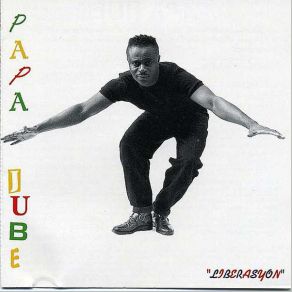Liberasyon
Download links and information about Liberasyon by Papa Jube. This album was released in 1993 and it belongs to World Music genres. It contains 12 tracks with total duration of 54:31 minutes.

|
|
|---|---|
| Artist: | Papa Jube |
| Release date: | 1993 |
| Genre: | World Music |
| Tracks: | 12 |
| Duration: | 54:31 |
| Buy it NOW at: | |
| Buy on iTunes $9.99 | |
Tracks
[Edit]| No. | Title | Length |
|---|---|---|
| 1. | Demokrasy | 4:49 |
| 2. | Anbago | 4:00 |
| 3. | Liberasyon | 4:37 |
| 4. | Soldat | 4:18 |
| 5. | Kompa Ragga | 4:48 |
| 6. | Standing In the Rain | 4:03 |
| 7. | Bib | 4:28 |
| 8. | Kapot | 5:05 |
| 9. | Embargo (English Version) | 4:01 |
| 10. | Demokrasy (Instrumental) | 4:54 |
| 11. | Bib (Instrumental) | 4:30 |
| 12. | Standing In the Rain (Remix) | 4:58 |
Details
[Edit]Liberasyon is such an accomplished debut blend of hip-hop and ragamuffin, Jamaican dancehall and Haitian Creole roots styles, you wonder why Papa Jubee hasn't released more discs. The U.S.-born Jubee, who played in reggae bands and handles percussion, keyboard, and bass here, was initially tagged as Haitian rap/ragga, which might suggest a turn-on-the-drum-machine-and-do-Shabba Ranks-inna-areole-patois-stylee. Liberasyon is way more musical than that — there's a kaleidoscope of riddims but the key thing is that everything sounds natural and unforced. There are few slack moments musically and lyrically, and "Standing in the Rain" rings so many bells it feels like a cover of some Jamaican classic (the credits say it's not). A bluesy piano lick opens "Demokrasy" before the drum machine and reggae skanks take over, and "Anbago" gets ragga-rowdier with lead guitar and keyboard, bass and an abrupt end to a good groove. The title track is more frantic, with roots gwo ka percussion, and "Kompa Reggae" lives up to its title with a blend of French Caribbean rhythms, like the rapid-fire dancehall rap over a smooth zouk groove. "Soldat" drops into an adapted bogle-beat (that's the "Murder She Wrote" lick), as Jubee shows his adroit command of incrementally dropping instruments in and out of the arrangements — the song breaks down into an English rap bridge with spacy percussion and a brief, heavy guitar solo before the keyboard bassline re-takes control. Using synths for horns and atmospheric effects don't hurt here, or on "Bib," and other pushing dancehall tracks hit the hips like the pretty pure ragamuffin "Kapot," or the rapid-fire rocking with vocals and drums on "Embargo." The last three tracks are instrumental versions of two songs and a remix virtually identical to the original — chalk 'em up to extras for a Haitian market entering the CD age, or D.I.Y. blueprints for practicing your own raps. The latter reason fits the always positive lyrics that call for consciousness and invoke taking control of your life. It's just one of the elements integrated so cannily and organically into the music on Liberasyon, a disc that should have signaled the arrival of a next generation French Antilles sound. So why no follow-up? And where on earth did Papa Jubee disappear to?